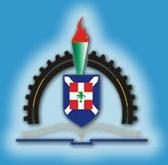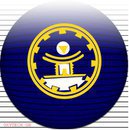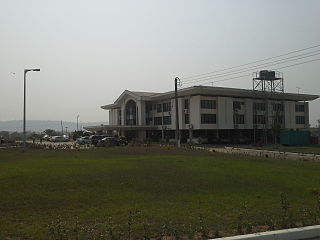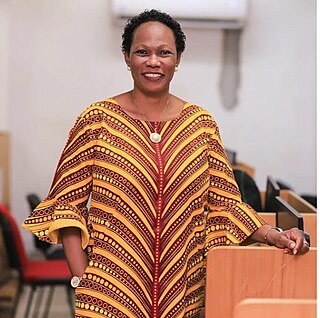Related Research Articles

Sanitation refers to public health conditions related to clean drinking water and treatment and disposal of human excreta and sewage. Preventing human contact with feces is part of sanitation, as is hand washing with soap. Sanitation systems aim to protect human health by providing a clean environment that will stop the transmission of disease, especially through the fecal–oral route. For example, diarrhea, a main cause of malnutrition and stunted growth in children, can be reduced through adequate sanitation. There are many other diseases which are easily transmitted in communities that have low levels of sanitation, such as ascariasis, cholera, hepatitis, polio, schistosomiasis, and trachoma, to name just a few.

Kwame Nkrumah University of Science and Technology (KNUST), commonly known as UST, Tech or Kwame Tech, is a public university located in Kumasi, Ashanti region, Ghana. The university focuses on science and technology. It is the second public university established in the country, as well as the largest university in the Ashanti Region of Ghana.

The University of Education, Winneba (UEW) is a university in Winneba, Central Region of Ghana. It was established in 1992 by a government ordinance and with a relationship with the University of Cape Coast. Its main aim is to train teachers for the education system of Ghana. The University of Education, Winneba is charged with the responsibility of teacher education and producing professional educators to spearhead a new national vision of education aimed at redirecting Ghana's efforts along the path of rapid economic and social development. The University of Education, Winneba is expected to play a leading role in Ghana's drive to produce scholars whose knowledge would be fully responsive to the realities and exigencies of contemporary Ghana.

The Presbyterian University, Ghana is a partially private & public university with multi- campuses and its headquarters located at Abetifi-Kwahu in the Eastern Region of Ghana. It is one of the new universities in Ghana granted accreditation by the Ghana Tertiary Education Commission – GTEC. It was established by the Presbyterian Church of Ghana (PCG) on 23 November 2003 and inaugurated on 27 March 2004 by the former president of Ghana in that republic, John Agyekum Kufuor.

The water supply and sanitation sector in Ghana is a sector that is in charge of the supply of healthy water and also improves the sanitation of water bodies in the country.
The College of Agriculture and Renewable Natural Resources (CANR) is one of the six colleges of Kwame Nkrumah University of Science and Technology in Ghana.
The College of Engineering is one of the six colleges of the Kwame Nkrumah University of Science and Technology, in Kumasi, Ghana. It was established in October 1952 to prepare students for professional qualifications only. It has since grown and expanded and now as a college runs 15 BSc, 20 MSc, MPhil and PhD programmes under 3 faculties; the faculty of Electrical and Computer Engineering, the faculty of Civil and Geo Engineering and the faculty of Mechanical and Chemical Engineering and 10 academic departments.
The KNUST Department of Planning (DOP) is one of the academic departments at the Kwame Nkrumah University of Science and Technology in Kumasi, Ghana. It is under the College of Art and Built Environment, specifically under the Faculty of Built Environment. The department offers undergraduate and postgraduate programmes in the award of a degree. It is the only institution in Ghana professionally recognized by its government to train personnel to promote, coordinate and manage development at the national and sub-national levels.

The KNUST Senior High School is a co-educational institution in Kumasi, Ghana. The school's nickname, in the Akan language, is Mmadwemma, meaning "people who carefully think before acting".
The University College of Management Studies is a private university college in Accra and Kumasi, Ghana. The school is affiliated with the School of Business of Kwame Nkrumah University of Science and Technology, Kumasi and the University of Education Winneba, Kumasi Campus.

The National Accreditation Board (NAB) of Ghana is the Government of Ghana agency responsible for the regulation, supervision and accreditation of tertiary institutions in Ghana. It is an agency under the Ministry of Education.

Koforidua Technical University is one of the ten Technical Universities established in every region in Ghana. It was founded in 1997. Since 1999 it has produced graduates with HNDs in accountancy,, marketing, purchasing and supply, statistics and computer science, and currently offers degree programmes.
Letitia Eva Takyibea Obeng was the first Ghanaian woman to obtain a degree in zoology and the first to be awarded a doctorate. She is described as "the grandmother of female scientists in Ghana".
Samuel Nii Odai is a Ghanaian professor of Hydraulics and Water Resources, and a serving Vice Chancellor of Accra Technical University. He is a Commonwealth Academic Fellow, and a recipient of the National Best Research Scientist Gold Award for water, environment and sanitation.
Ruth Ama Gyan-Darkwa is a Ghanaian academic prodigy. She is the youngest student to be admitted to the Kwame Nkrumah University of Science and Technology in Kumasi. She is currently the youngest person to be admitted at the University of New Mexico to study at the PhD level.
Richard Tuyee Awuah is a Ghanaian academic, and Plant Pathologist. He was the dean of the faculty of Agriculture of the Kwame Nkrumah University of Science and Technology, and the principal of the University of Education's College of Agriculture.

Atinuke Olusola Adebanji is a Nigerian academic. She is the first female professor of statistics in Ghana and the founding head of the Department of Statistics and Actuarial Science at the Kwame Nkrumah University of Science and Technology in Ghana.
References
- ↑ "Prof Esi Awuah calls for a shift from grades-oriented curricula". 12 June 2017.
- ↑ "Energy & Natural Resources University, blessing for Ghana-VC". GhanaWeb. 4 May 2012. Archived from the original on 26 May 2012. Retrieved 4 January 2013.
- ↑ "Ghana inducts second female University Vice Chancellor". GhanaToGhana. 18 November 2012. Archived from the original on 27 April 2017. Retrieved 4 January 2013.
- 1 2 3 4 "Mrs. Esi Awuah, Prof. (Senior Member)". University of Energy and Natural Resources. Archived from the original on 8 August 2014. Retrieved 31 July 2014.
- ↑ "Environmental Sanitation is a way of life". Levers in Heels. Archived from the original on 12 August 2014. Retrieved 31 July 2014.